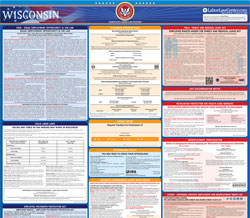 Wisconsin Child Labor Laws 2025
Wisconsin Child Labor Laws 2025
Contents :: Wisconsin Child Labor Law
Child labor laws on Wisconsin and <a href="/federal/child-labor-laws">Federal</a> levels exist to prevent the exploitation of minors for labor, and ensure that education is prioritized over work. Limitations on child labor vary by age, and may include restrictions on the types of work that can be done, maximum hours that may be worked, and limitations on late or overnight work.
Regulation of child labor may include the use of Employment Certificates issued by the minor's school or the state Labor Department, and/or an Age Certification document that verifies the minor's age for work purposes. This page details Wisconsin's child labor law regulations.
Mandatory Employment & Age Certification for Minors
Employment Certificates in Wisconsin
Employment Certificates, also known as Work Permits, are mandatory in Wisconsin for minors under 18. The certificate must be acquired by the minor and presented to their employer to verify their ability to work before they are hired.
In Wisconsin, both work permits and age certificates are issued by volunteer permit officers who are representatives of the Department of Workforce Development.
Many of the permit officers are school officials, but other public employees such as municipal and county employees and court officials are also included.
Acquiring a Wisconsin Employment Certificate:
In Wisconsin, Employment Certificates for minors are issued by the Wisconsin Department of Labor. An Employment Certificate will be issued if the minor meets all of the state's criteria for employment.
Age Certification in Wisconsin
Age certification is a process through which minors provide proof of their age to a prospective employer, which helps ensure that all child labor laws mandated for their age bracket are followed.
Age certification is not required in Wisconsin, but an age certificate is required by law to be provided on request for minors 18 and over.
Acquiring an Age Certificate in Wisconsin:
Under Wisconsin law, age certification for minors is carried out by the Wisconsin Department of Labor.
Minor Working Hour Restrictions in Wisconsin
Minors who are authorized to work in Wisconsin are subject to restrictions on when they can work, and how many hours they can work. The exact restrictions in effect depend on the age of the minor, and are designed to ensure that work does not interfere with the minor's schooling.
Maximum Hours of Work for Minors
Working hour restrictions limit how many hours a minor may work per day, and per week.
For Minors Under 16:
Maximum hours/days when school is not in session: 8 hours daily / 40 hours weekly/ 6 days weekly.
Maximum hours/days when school is in session: 4 hours per day (8 last school day of week and non-school day), and up to 18 per week.
For Minors Ages 16 and 17:
Wisconsin has no restrictions on maximum working hours for minors aged 16 and 17.
Notes: Wisconsin has no limit during non-school week on daily hours or nightwork for 16-and 17-year-olds. However, they must be paid time and one-half for work in excess of 10 hours per day or 40 hours per week, which ever is greater. Additionally, 8 hours rest is required between end of work and start of work the next day, and any work between 12:30 a.m. and 5 a.m. must be directly supervised by an adult.
Nightwork Restrictions for Minors
Nightwork restrictions set limits on how late a minor can legally work.
For Minors Under 16:
Work is prohibited during these hours: 7 p.m. (9 p.m. June 1 through Labor Day) to 7 a.m
For Minors Ages 16 and 17:
Wisconsin has no restrictions on nightwork for minors aged 16 and 17.
Special Child Labor Laws in Wisconsin
In addition to laws requiring work certificates or age verification for general employment of minors, most states have special regulations governing the employment of minors in agriculture (such as farm work and harvesting), and the entertainment industry (including child actors, models, and performers).
To learn about these special child labor laws in Wisconsin, see the following pages.
On a Federal level, child labor is regulated under the Fair Labor Standards Act (FLSA). Minors and students may additionally be subject to special labor law regulations regarding minimum wage, meal and break periods while working, and more.
Get a Wisconsin all-in-one labor law poster 
Instead of printing out pages of mandatory Wisconsin and Federal labor law posters, you can purchase a professional, laminated all-in-one labor law poster that guarantees compliance with all Wisconsin and federal posting requirements. Fully updated for April 2017!
Get All-In-One Poster Now
